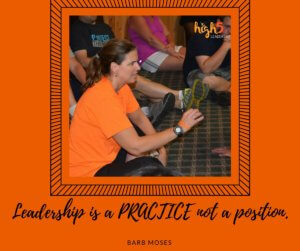09 Jan Leadership is a PRACTICE Not a Position

How much time did YOU spend last week working on your leadership skills? I would bet money that it wasn’t much time. I’m also willing to bet you know someone who is in a “leadership” position, yet they don’t exhibit many, if any, leadership skills. Most of us have worked for that person at some point in our careers, and many of us have also been that person. Based on my own leadership journey, I am clear that leadership isn’t a position. It is actually a consistent practice. A practice that we choose because we desire to be a better leader. That said, are you practicing?
I remember early in my “leadership” roles that I really thought I had it all figured out. I had moved up the ranks rather quickly, so I must have been good, right? Of course, I read a couple management books that my boss gave me. I went to the HR workshops where I learned about sexual harassment, workplace safety, and conducting performance reviews. Armed with all that knowledge, I believed I was very in touch, and knew I was a good leader. In retrospect, I wasn’t, but I didn’t know what I didn’t know. Frankly, I wasn’t even a very good manager, let alone a good leader.
It never dawned on me that I should actually work on my leadership skills. I figured it was the responsibility of the company I was working for to make sure I learned what I needed to know. Surely, I wasn’t responsible for that myself. If it wasn’t a priority for them, it wasn’t a priority for me.
It’s a widely held belief that it’s the company’s responsibility to invest in employee development. What if the company doesn’t? Does that mean the employees aren’t worth developing? Does that mean the employees don’t need developing? In truth, if we want to be good at something, we need to practice, and that includes being good at leading. It’s been said that Michael Jordan only quit practicing when they kicked him out of they gym, and then he practiced in his mind. As soon as we think we have arrived and we know all the answers, it’s game over.
To that end, here are three ways to continuously work on your leadership skills.
1. Increase your level of self-awareness. The first key to self-awareness is to admit that we don’t know it all because none of us do. The way we become more self-aware is to examine our thoughts, beliefs and behaviors and to ask ourselves “Why?” Why do we believe that? Why did we choose to act that way? Why was our first thought negative? What is the story I am telling myself about this situation, and where did it come from?
We spend most of our day just spitting out behaviors and answers from our sub-conscious programming, pulling from what we’ve learned in the past. It’s only when we stop to look at our stories and patterns, that we’ll begin to see the way we’ve always done something may not be the best way. Create a leadership journal. Spend time each day and/or week examining what went well and what might be a better approach.
2. Ask for feedback. Other people can see what you can’t. We all have blind spots. Find a trusted mentor who you can ask for guidance to run scenarios by and who will give you quality feedback. There is always more than one right answer. However, until we find someone we trust to help us see what we can’t, the other answers will remain invisible. This is directly related to the self-awareness conversation in item #1.
It’s also very powerful to ask the people who you lead for feedback. It takes courage to do so because you may hear some things you didn’t really want to hear, so if you’re asking the question, be prepared for the answer. The information is priceless, though, because it will allow you to approach situations with more awareness moving forward.
3. Learn from the experience of others. We learn best from our own experiences. However, we can also speed up the learning process by seeing how others handle leadership challenges. Read or listen to books, podcasts, and articles on leadership practices. Remember, our goal is to be a permanent student in the leadership school of life. Pick one idea from the books or articles and put it into practice during the week. Then, write your own article helping others learn from your experiences. A great way to become an expert at something is to teach it.
Develop your own leadership practice. What will you do today to become a better leader? How will you expand your awareness to see what’s working well and what you will do differently next time? When you work on yourself, your other relationships will improve as well.
At High5 Leadership we speed up the self-awareness process through our experiential classes and events. The data you examine during our classes are your own thoughts, beliefs and behaviors, so that you can understand what is working well in your world and what might work even better. We take leadership development seriously because, in addition to leading your teams at work, you are leading even more important teams at home. For more information on how to speed up your transformation, contact us at info@high5leadership.com and visit our website at high5leadership.com.


